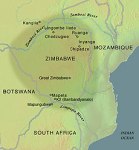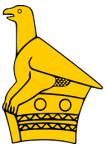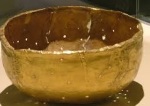
After talking about the origin of the name of the country Zimbabwe, named after Great Zimbabwe, the capital of the Kingdom of Zimbabwe which flourished in southern Africa from the 13th to 17th century, I thought it only wise to talk about some of the kingdoms that flourished in that area, starting with the Kingdom of Mapungubwe, a predecessor to the Kingdom of Zimbabwe. The Kingdom of Mapungubwe was a rich iron age civilization that flourished in the area of modern-day Zimbabwe, Botswana, and South Africa, from the 10th to the 13th century AD. It was a pre-colonial state located at the confluence of the Shashe and Limpopo rivers. The kingdom’s development culminated in the creation of the Kingdom of Zimbabwe in the 13th century, as a normal evolution of itself, and with gold trading links to Rhapta and Kilwa Kisiwani on the African east coast.

From archaeological searches, the people of Mapungubwe were of the Venda and Kalanga people ancestry, and were attracted to the Shashe-Limpopo area because of its fertile soils for agriculture, and also because it was an area rich with elephants, thus rich with ivory. The area of Mapungubwe was also rich in gold, and the people traded in gold and ivory, snail shells, pottery, wood, and ostriches’ eggs (eggshells), with places as far as Egypt, Persia, India, and China.

Stone walls were used to demarcate important areas, and important residences were built with stone and wood. Life in Mapungubwe was centered around family and farming. The kingdom, as well as the way people lived, was divided into a three-tiered hierarchy, with the commoners inhabiting low-lying sites, district leaders occupying small hilltops, and the kingdom’s elites residing at the capital at Mapungubwe hill as the supreme authority. Important men maintained prestigious homes on the outskirts of the capital.

The kingdom was named after its capital city, the city of Mapungubwe. Several theories have been put forward for the meaning of the name itself. For some, Mapungubwe means “place of Jackals,” or “place where jackals eat,” or “hill of jackals.” In Shona, the language spoken by the majority of people in Zimbabwe, Mapungubwe means “rocks of the Bateleur eagle,” a bird which has deep spiritual connotations in the Shona culture (ma = many; pungu =suffix for chapungu = bateleur eagle, the massive bird which once graced the entrance of the royal complex of Great Zimbabwe; bwe = diminutive for ibwe = stone).

The site was rediscovered in 1932. At the top of Mapungubwe, they found many golden objects: bangles, beads, nails, miniature buffalo, rhino, a skeleton, and gold anklets, about 2.2 kg of gold and many other clay and glass artifacts. Between 1933 and 1998, the remains of about 147 individuals were excavated from the Mapungubwe Cultural Landscape. These findings were kept quiet for a long time, as they provided contrary evidence to the racist ideology of black inferiority underpinning apartheid.

So any time you think about southern Africa only being populated by pastoralists, nomadic peoples, think again. There were very rich, and strong empires, such as the kingdom of Mapungubwe which was the first major iron age kingdom in Southern African, and traded with places as far as Egypt, Persia, India and China. For more information, check out the very rich Mapungubwe National Park website, South Africa.info, the Metropolitan Museum (MET) article, South African History Online, the Mapungubwe Kingdom website, and the UNESCO World Heritage website as Mapungubwe is listed. Enjoy the video below!


Great very informative article. I had heard of Great Zimbabwe but this is the first time I’m hearing about Mapungubwe. Thank you for taking the time out to research and develop this resource!
LikeLike
Thank you for the great support
LikeLike
Reblogged this on Tdcamicia's Blog.
LikeLike
Pingback: History Monday: A Summary of Kingdom of Mapungubwe – Zimbabwe Monitor
That’s a great article. I wasn’t too familiar with some of the Southern African kingdoms, but it did open my eyes when it came to that part of the continent.
LikeLike
“Mapungubwe were of the Khoi/San people ancestry” how can nomads people build a kingdom this tribalist archeologists who don’t want to admit that Vha-Venda people build Mapungubwe rather go to hell or Europe all the same to me, or we Vha Venda will see to it that none of this people touch the soil of our ancestor
LikeLike
Thank you Phumudzo for the information. I have checked with all the other sources, and I have made the change… thanks for your comment. By the way, the Venda and Kalanga people are said to have a common ancestry, who are their ancestors?
LikeLike
DERAR FACILITATOR
I AM JOYFUL TO KNOW THAT ZIMBABWE COMES FROM THE NAME STONE(IBWE) IT MEANS THAT THERE WERE MANY STONES (DIFFERENT KINDS) IN THIS AREA HENCE THE NAME BUT WHY HAS IT FADED OUT ON THE MAP????? THE SHONA HAVE MANY CHARACTERISTICS WITH THE BAMASABA TRIBE IN UGANDA. FOR EXAMPLE THE WAY THEY PREPARE AND EAT PAMPUKINS’S LEAVES IS THE WAY WE DO. IN FACT WE DO MANY THINGS IN THE SAME WAY
LikeLike
Thank you Mubakye for your comment. Yes… Zimbabwe even has a lot in common with some tribes in Central Africa. It is most likely from the great Bantu migration. We are all brothers.
What do you mean by faded on the map? Can you clarify? Is it on today’s map? or are you asking about Great Zimbabwe’s importance and decline over centuries?
LikeLike
Dear Dr. Y.
I WAS MEANING Mapungubwe AS THE NAME. WHY DID IT DISAPPEAR YET TO HISTORIANS LIKE ME I FEEL MORE CONFIDENT IN ANCIENT NAMES. THE STORY SHOWS THAT IT WAS ONE OF THE GREATEST KINGDOMS IN ANCIENT TIMES. I WOULD LOVE TO HEAR ABOUT SUCH NAMES. THEY SOUND NICE FOR ME. I WANT TO LEARN MORE OF SUCH. I DID WEST AFRICAN HISTORY. I NOW WANT SOUTH AFRICAN HISTORY.
LikeLike